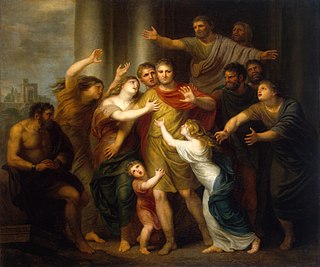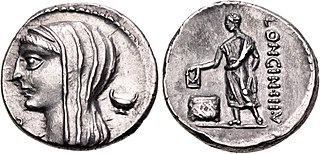Related Research Articles
80s BC is the time period from 89 BC – 80 BC.

Year 89 BC was a year of the pre-Julian Roman calendar. At the time it was known as the Year of the Consulship of Strabo and Cato and the Fourth Year of Zhenghe. The denomination 89 BC for this year has been used since the early medieval period, when the Anno Domini calendar era became the prevalent method in Europe for naming years.

Lucius Cornelius Scipio Asiaticus was a general and statesman of the Roman Republic. He was the son of Publius Cornelius Scipio and the younger brother of Scipio Africanus. He was elected consul in 190 BC, and later that year led the Roman forces to victory at the Battle of Magnesia.
Lucius Aemilius Paullus Macedonicus was a two-time consul of the Roman Republic and general, who conquered Macedon in the Third Macedonian War.

The gens Claudia, sometimes written Clodia, was one of the most prominent patrician houses at ancient Rome. The gens traced its origin to the earliest days of the Roman Republic. The first of the Claudii to obtain the consulship was Appius Claudius Sabinus Regillensis, in 495 BC, and from that time its members frequently held the highest offices of the state, both under the Republic and in imperial times.

The gens Atilia, sometimes written Atillia, was a plebeian family at ancient Rome, which rose to prominence at the beginning of the fourth century BC. The first member of this gens to attain the consulship was Marcus Atilius Regulus, in 335 BC. The Atilii continued to hold the highest offices of the state throughout the history of the Republic, and well into imperial times.

The gens Cassia was a Roman family of great antiquity. The earliest members of this gens appearing in history may have been patrician, but all those appearing in later times were plebeians. The first of the Cassii to obtain the consulship was Spurius Cassius Vecellinus, in 502 BC. He proposed the first agrarian law, for which he was charged with aspiring to make himself king, and put to death by the patrician nobility. The Cassii were amongst the most prominent families of the later Republic, and they frequently held high office, lasting well into imperial times. Among their namesakes are the Via Cassia, the road to Arretium, and the village of Cassianum Hirpinum, originally an estate belonging to one of this family in the country of the Hirpini.

The gens Licinia was a celebrated plebeian family at ancient Rome, which appears from the earliest days of the Republic until imperial times, and which eventually obtained the imperial dignity. The first of the gens to obtain the consulship was Gaius Licinius Calvus Stolo, who, as tribune of the plebs from 376 to 367 BC, prevented the election of any of the annual magistrates, until the patricians acquiesced to the passage of the lex Licinia Sextia, or Licinian Rogations. This law, named for Licinius and his colleague, Lucius Sextius, opened the consulship for the first time to the plebeians. Licinius himself was subsequently elected consul in 364 and 361 BC, and from this time, the Licinii became one of the most illustrious gentes in the Republic.

Gaius Marius "the Younger" was a Roman republican general and politician who became consul in 82 BC with Gnaeus Papirius Carbo. He was the son of the Gaius Marius who was the victor of the Jugurthine and Cimbric wars. He fought in Sulla's civil war. He committed suicide that same year at Praeneste, after his defeat by Sulla and during the city's capture by Quintus Lucretius Afella.
Publius Licinius Crassus Dives Mucianus was the natural son of Publius Mucius Scaevola and Licinia, and brother of Publius Mucius Scaevola. He was adopted at an unknown date by Publius Licinius Crassus, his mother's brother, or by a son of the consul of 205 BC, Publius Licinus Crassus Dives.

The gens Cornelia was one of the greatest patrician houses at ancient Rome. For more than seven hundred years, from the early decades of the Republic to the third century AD, the Cornelii produced more eminent statesmen and generals than any other gens. At least seventy-five consuls under the Republic were members of this family, beginning with Servius Cornelius Maluginensis in 485 BC. Together with the Aemilii, Claudii, Fabii, Manlii, and Valerii, the Cornelii were almost certainly numbered among the gentes maiores, the most important and powerful families of Rome, who for centuries dominated the Republican magistracies. All of the major branches of the Cornelian gens were patrician, but there were also plebeian Cornelii, at least some of whom were descended from freedmen.

The Julii Caesares were the most illustrious family of the patrician gens Julia. The family first appears in history during the Second Punic War, when Sextus Julius Caesar was praetor in Sicily. His son, Sextus Julius Caesar, obtained the consulship in 157 BC; but the most famous descendant of this stirps is Gaius Julius Caesar, a general who conquered Gaul and became the undisputed master of Rome following the Civil War. Having been granted dictatorial power by the Roman Senate and instituting a number of political and social reforms, he was assassinated in 44 BC. After overcoming several rivals, Caesar's adopted son and heir, Gaius Julius Caesar Octavianus, was proclaimed Augustus by the senate, inaugurating what became the Julio-Claudian line of Roman emperors.
Lucius Julius Caesar was a Roman politician and senator who was elected consul of the Roman Republic in 64 BC. A supporter of his cousin, the Roman dictator Gaius Julius Caesar, Lucius was a key member of the senatorial coalition which strove to avoid civil war between the Roman Senate and his nephew Marcus Antonius in the aftermath of Caesar's assassination in 44 BC.

Gaius Porcius Cato was a Roman politician and general, notably consul in 114 BC. He was the son of Marcus Porcius Cato Licinianus and grandson of Cato the Censor.
Marcus Porcius M. f. M. n. Cato Salonianus was the younger son of Cato the Elder, and grandfather of Marcus Porcius Cato Uticensis, also known as "Cato the Younger".

The gens Porcia, rarely written Portia, was a plebeian family at Ancient Rome. Its members first appear in history during the third century BC. The first of the gens to achieve the consulship was Marcus Porcius Cato in 195 BC, and from then until imperial times, the Porcii regularly occupied the highest offices of the Roman state.
Lucius Valerius Flaccus was a Roman politician and general. He was consul in 195 BC and censor in 183 BC, serving both times with his friend Cato the Elder, whom he brought to the notice of the Roman political elite.

Lucius Porcius Cato was a Roman general and politician who became consul in 89 BC alongside Gnaeus Pompeius Strabo. He died at the Battle of Fucine Lake, possibly at the hands of Gaius Marius the Younger.
Sextus Julius Caesar was a Roman praetor in 208 BC, during the Second Punic War. He is thought to be the ancestor of all of the later Julii Caesares who appear in history, such as Roman dictator Julius Caesar and emperor Augustus.